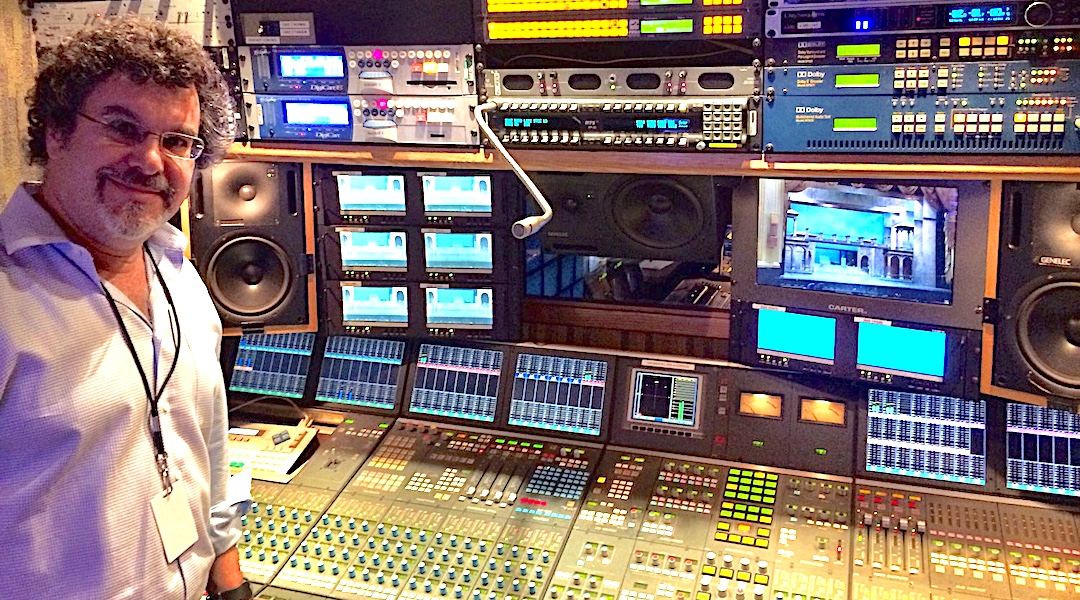Adam Abeshouse, Jewish producer of classical recordings, dies at 63
His resume included three Grammy Awards as well as a side gig setting up his synagogue’s sound system

Adam Abeshouse produced and engineered recordings for major classical labels in a career that spanned over 30 years. (Abeshouse Productions)
(JTA) — Adam Abeshouse, a producer of classical music whose resume included three Grammy Awards as well as side gigs performing on Broadway in the pit orchestra of “Fiddler on the Roof” and setting up his synagogue’s sound system, died Thursday at his home in Westchester County, New York. He was 63.
The cause was bile duct cancer, according to his family.
A trained violinist who built what his wife Maria Abeshouse called his “dream” studio (and what the pianist Joshua Denk called a “nerd’s paradise”) at their home in South Salem, New York, Abeshouse produced recordings for a roster of A-list musical artists. They included violinists Itzhak Perlman and Joshua Bell, pianists Emanuel Ax and Simone Dinnerstein, and ensembles ranging from The Kronos Quartet to Russia’s St. Petersburg Philharmonic Orchestra.
His Grammys included classical producer of the year, in 1999.
He was also the founder, in 2002, of the Classical Recording Foundation, which helped artists record their passion projects when major record labels had begun to retreat from what the New York Times once called, in a story about the foundation, “projects of high artistic merit but low commercial priority.”
When others would wonder why the world needed more versions of previously recorded works, Abeshouse offered a sports analogy.
“But does anyone invoke that sort of reasoning when it comes to great tennis matches or baseball games?” he asked in a profile in The New Yorker in 2002. “If that axiom were applied to sporting events, the stadiums would be empty.”
Abeshouse was also a regular at his synagogue, the Pelham Jewish Center in Westchester County, where in addition to setting up the sound system, he would play in various ensembles, including on the holiday of Purim. “I have a Grammy-award winning sound engineer making sure everyone can hear my sermons,” the synagogue’s rabbi, Benjamin Resnick, joked at Abeshouse’s funeral on Friday.
Adam and Maria Abeshouse traveled to Israel with a group from the synagogue in 2005, and would return another five times.
“Growing up as Adam’s daughter meant joyful Shabbat dinners, delicious food and superb wine,” his daughter Emily recalled at the funeral.
Before turning nearly full time to recording others, Abeshouse was a freelance violinist who appeared as a sub in the orchestra pits of Broadway musicals, including productions of “Fiddler on the Roof” in the 1990s. He can also be seen performing in the 1980 movie “Fame” about students at a performing arts high school in New York City.
Born June 5, 1961, Abeshouse grew up in Westbury, Long Island. His grandfather left Russia for China in the early years of the 20th century and spent 10 years in Harbin, a city in Northern Manchuria that was briefly a haven for Jews fleeing the Pale of Settlement. A balalaika player in the czar’s army orchestra, his grandfather eventually settled in Sydney, Australia, where he opened a music store.
Abehouse’s father, Jack, an accomplished amateur musician whose company compounded flavors and fragrances, moved to New York in 1952 and married his mother, Evy.
Abeshouse began playing violin in the third grade. He studied at New York University and the Manhattan School of Music.
This summer, when his disease metastasized and he entered home hospice, Abeshouse had two requests, according to his wife. The first was that the wedding of their daughter Emily to Jesse Weisfelner, a former lone soldier in the Israeli military, be moved from Dec. 29 to Sept. 15; the second was that friends and clients come to his studio for what would be a farewell concert a few weeks later.
According to a report in NPR, among those gathered for the concert were Bell, Denk, pianist Lara Downes and the string trio Time for Three.
“We’ve made many many recordings together,” Bell told NPR. “I’ve spent many hours with him in the studios, doing a process which is usually excruciating for me. But with him it always became a fun time together. Those moments have been so precious to me.”
“He was able to enjoy and take part in both” the wedding and the concert, Maria, his wife of 38 years, told the Jewish Telegraphic Agency. “He was very sociable, and afterwards he was pretty wired for a long time. He had meetings, then a big meeting on the phone the next day for his classical recording foundation. That and the studio were legacies that he wanted to go on.”
His survivors include his wife, his daughters Emily and Sarah, and a brother, David.













